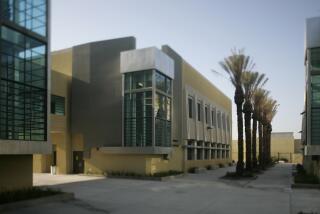Student arrested in bus tagging
He goes by the nickname “Zoner” and he apparently tagged the wrong bus in the wrong place at the wrong time.
A 15-year-old sophomore at the Santee Education Complex in South L.A. was arrested late Tuesday on suspicion of being the student who scrawled his nickname on the outside window of a city bus carrying Mayor Antonio Villaraigosa and Schools Supt. David L. Brewer, among others.
Santee Principal Vince Carbino, who was also on the bus Monday, said he believed the youth had no idea that dignitaries were aboard -- but looked stunned, hid his face and stopped his tagging when he saw a photographer on the bus taking his picture.
Carbino said Tuesday that school officials had identified the youth, spoken to a parent and agreed to meet with them. He described the boy only as “having achievement issues in school.” The boy’s name, which was not made public, was turned over to the Los Angeles County Sheriff’s Department. Sheriff’s Det. Michael Shaw said the boy would likely face a misdemeanor charge of vandalism.
Still, the principal assured students in an intercom address Tuesday that he was less interested in punishing the student than in helping him. On Monday, he had said the brazen act appeared to be a “cry for help” from a troubled youth who needs counseling.
Zoner’s brush with infamy occurred as the mayor and superintendent were inaugurating a Metropolitan Transportation Authority bus stop at the school that would eliminate a two-block walk that exposed students to dangers of life in the area. When the bus stopped one block from the school, the youth struck.
Among the obvious questions being raised Tuesday on the campus, on talk radio and around the city was: What was he thinking?
“Who would do something stupid like that and risk getting caught?” said Santee student Tashanay Scott, 15.
One boy who said he was Zoner’s friend insisted the student wasn’t violent or malicious, but liked “messing around a lot.” The tagging had nothing to do with gangs, said Julio Osorio, 15.
“They do it for fun, to vandalize,” he said.
Villaraigosa said he hoped the tagger is punished. Counseling isn’t enough, he said Tuesday. The mayor said he would like to see the boy perform 100 hours of community service, which he hoped would be spent cleaning graffiti off buses.
“I’m not suggesting that someone like that should be put in jail,” Villaraigosa said. “But I’ll tell you something: Cleaning up that bus is what most people in Los Angeles would say is the right thing to do.”
MTA spokeswoman Helen Gilstrap said the agency does put convicted vandals to work, typically for 50 hours, as part of a restitution program, but that scrubbing graffiti is not among their jobs. She added that the agency spends $7 million a year removing graffiti from its buses and trains.
The tagging incident was the latest blow to the image of a school that was to be a model for the district when it opened in July 2005 as the city’s first new high school in three decades. As it struggled to gain its footing, Santee was beset by violence and gang rivalries, and its social problems were matched by its academic failures.
Jordan Henry, an English teacher who heads the United Teachers Los Angeles chapter at Santee, was troubled enough to send an e-mail to the Board of Education in which he said the event “mirrors all too closely the reality of what has been the Santee Experiment thus far.”
He complained that academic achievement at the school has been miserable, and there has been high staff turnover.
Noting that Carbino had described the act as a cry for help, Henry wrote: “I ask you to look at Santee’s test scores. To look at Santee’s attrition rate. To look at Santee’s brief, tumultuous history. It is a cry for help, true. But not just from one student. From ALL of us here at Santee. Help!”
Carbino said he believed the school has greatly improved since its disastrous first few months, and cited a dramatically reduced rate of suspensions and improved passing rate as evidence. He said he wasn’t especially concerned that the bus tagging would damage the school’s reputation. He said he was more concerned about the boy.
“It’s events like this that push kids back,” Carbino said. “We don’t want this to turn into something that would push a kid out of school for the rest of his life.”
With The Times’ front-page photograph of the tagging in hand, Carbino said he and three school police officers had waited for the student at the school’s main gate Tuesday morning but did not see him enter. Students later told him the boy had not come to school. However, Osorio, his friend, said the boy came late to his second-period homeroom class.
In interviews in the school courtyard, most students dismissed the incident as a minor distraction. Some said it was funny.
Ninth-grader Danny Alvarado said he hardly notices graffiti “because you see it every day.”
But 11th-grader Susana Hernandez, who stopped to talk on her way to cheerleading practice, was more concerned. “People already think this school’s a mess, and this just makes the reputation worse,” she said. “It’s not like that.”
And Anthony Rubio, a member of the Peace Committee that pushed to have the bus stop added, said he was especially upset that the incident occurred while the mayor was on the bus.
“It was disrespecting him,” said the 17-year old junior, adding that other students Tuesday were “glorifying” the tagger. “They were saying, ‘hat’s my homie, that’s my homie.’ ”
*
Times staff writer Duke Helfand contributed to this report.
More to Read
Sign up for Essential California
The most important California stories and recommendations in your inbox every morning.
You may occasionally receive promotional content from the Los Angeles Times.










